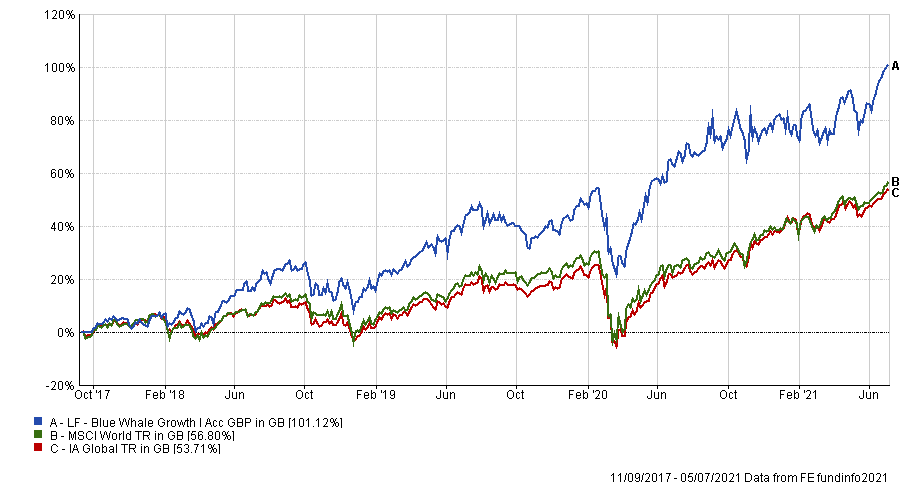Blue Whale Capital co-founder Peter Hargreaves has warned investors against taking profits from LF Blue Whale Growth now it has doubled its money since launch in September 2017.
Hargreaves, who also co-founded investment platform Hargreaves Lansdown, set up Blue Whale Capital alongside fund manager Stephen Yiu in September 2017, putting in £25m of his own money.
This proved to be a shrewd investment, with the fund making 101.12 per cent over this time, compared with 56.0 per cent from the MSCI World index and 53.71 per cent from the average fund in the IA Global sector.
Performance of fund since launch

Source: FE Analytics
However, he said the consistent manner in which the fund has delivered these gains means investors would be unwise to take profits, pointing to some statistical modelling he carried out “many years ago”.
“My premise was that if an investment fund appeared in the top quartile of performance for five consecutive years, it would probably be the number-one fund over those five years,” he said.
“The analysis proved the hypothesis was pessimistic. In general, a fund only had to be in the top half of performance each year to end up top over five years.
“This research convinced me that an aggressive or risky strategy is never necessary in providing excellent results.”
LF Blue Whale Growth delivered 8.39 per cent in 2018 – which was the sixth-best return out of 346 funds in the sector.
In 2019, the fund delivered 27.32 per cent – again, a top-quartile rank – followed by 27.06 per cent in 2020, also a top-quartile rank. Year-to-date, the strategy is up 11.62 per cent, which puts it in the second quartile.
However, the fund’s assets under management have been growing at a much faster pace. By the end of 2018, the fund was roughly £80m in size. Fast-forward to today and its assets are worth £863m – more than a 10-fold increase.
Hargreaves contested the assertion from industry commentators who characterise the strategy as a “speculative” tech fund, even though 54.2 per cent of its holdings are in the technology sector.
“It is true many of the major holdings have harnessed technology, but purely to enhance their businesses,” he explained.
“Alphabet (Google) uses advanced algorithms to enhance users’ searches and to deliver targeted advertising. Amazon is the world’s greatest retailer and uses every bit of tried and tested technology to augment all facets of its business.
“Neither of these companies could be described as speculative tech businesses. Their market-leading positions in their respective fields afford massive pricing power if inflation becomes a reality.”
Hargreaves said that there are occasions when you should take profits from a strong performer, but only if the investment is in a very “narrow sector” or has taken a “speculative stance”.
However, he said that ditching LF Blue Whale Growth would fly in the face of the strategy of selling your losers and keeping the winners.
“It is not unusual for in-vogue sectors to get over-heated and there is nothing wrong in crystallising some of those profits,” he said. “Blue Whale however is not a sector play.
“Whilst we have invested in stocks with a technology base, we also have positions in consumer goods and sustainable brands. We have also reduced the American exposure as we saw the threat of inflation.
“We also appraise carefully that our companies have future earnings to warrant the share price. Buy and hold is not a bad strategy, but when a company becomes extremely overvalued, there will be superior opportunities.”
When it comes to his own cash, Hargreaves said that he and his family are still adding to their holdings in Blue Whale and currently have more than £200m invested in the group – after noting how Terry Smith has also personally invested a similar amount in his £26.2bn Fundsmith Equity strategy.
Looking back, Hargreaves recalled how much uncertainty there was in global markets just before Blue Whale Growth launched in 2017, after a surprise Brexit vote and the election of Donald Trump.
“Despite the pessimism, we still felt there was opportunity,” he said. “However, I would not have been brave enough to predict initial investors would double their money in under four years.
“It has been a challenge, but careful stock selection can weather most markets,” he finished.
Blue Whale Growth has an ongoing charges figure (OCF) of 1.14 per cent.





